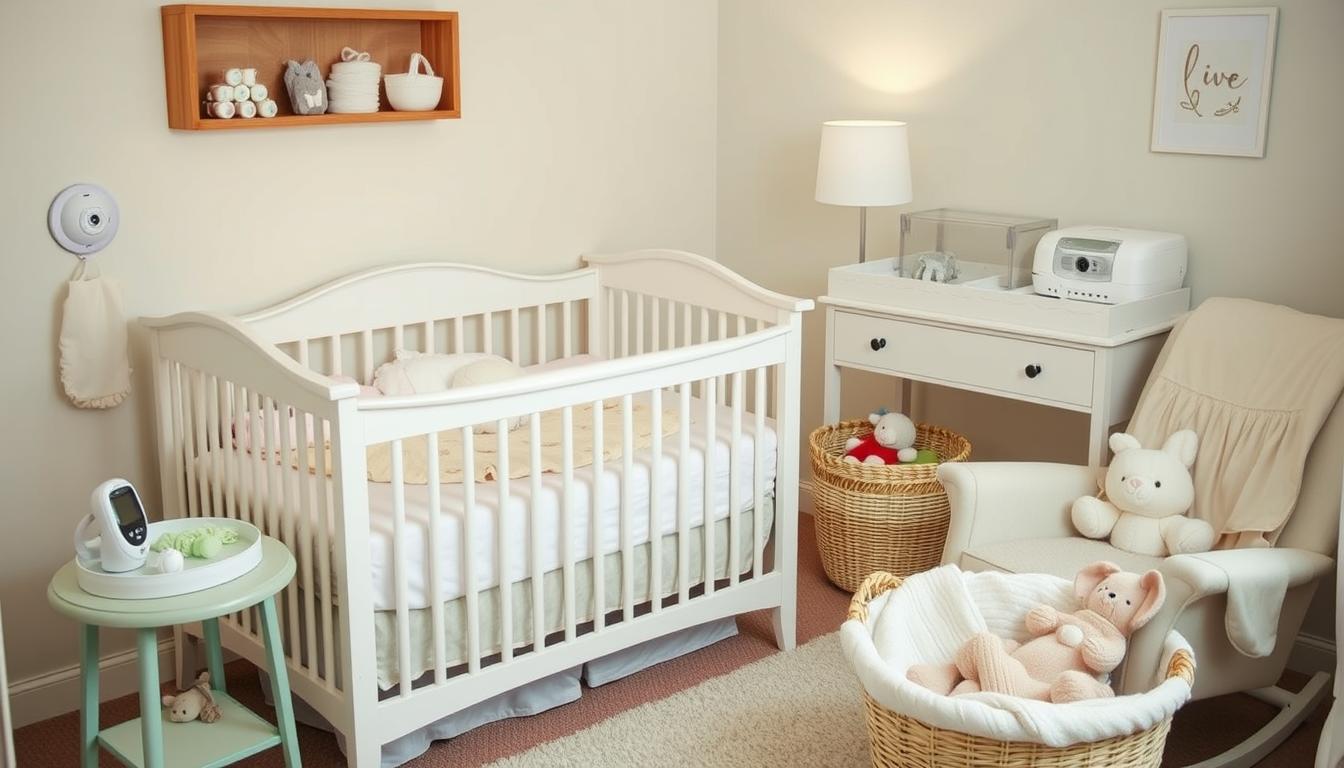Welcoming a newborn is a big step in life. It’s important to focus on your baby’s health and well-being. You need to keep an eye on your baby’s growth and make sure they are safe and cared for.
Regular visits to the pediatrician are key for your baby’s health. They help track your baby’s growth and address any issues early.
This guide will give you the info and tips you need to care for your newborn. We’ll cover feeding, diapering, sleep, and safety. By knowing what your baby needs, you can support their growth and enjoy this special time.
Newborn care might seem tough at first, but you can do it with the right knowledge. This article is here to help, whether you’re a first-time parent or adding to your family. Let’s look at the key parts of newborn care to help your baby thrive.
Key Takeaways
- Regular newborn checks with a pediatrician are essential for monitoring your baby’s health and development.
- Creating a safe sleep environment and following safe sleep guidelines can reduce the risk of SIDS.
- Understanding your newborn’s hunger cues and establishing a feeding routine, whether breastfeeding or formula feeding, is crucial for proper nutrition and growth.
- Bonding with your baby through skin-to-skin contact, gentle touch, and responsive care promotes emotional and cognitive development.
- Recognizing signs of illness and knowing when to seek medical attention is vital for your newborn’s well-being.
Preparing for Your Newborn’s Arrival
As you wait for your baby to arrive, make sure you have everything your little one needs. This includes all the baby supplies and a nursery setup that ensures safe sleep. Preparing early makes the start of parenthood easier and less stressful.
Essential Supplies for Your Baby
Before your baby comes home, gather these must-have items:
- Diapers and wipes
- Clothing, including onesies, sleepers, and outfits
- Feeding essentials, such as bottles, nipples, and formula (if not breastfeeding)
- Bathing supplies, including a baby bathtub, washcloths, and gentle baby soap
- Grooming items, such as a soft-bristled brush, nail clippers, and a nasal aspirator
- Pacifiers and teething toys
- Stroller and car seat for safe transportation
Having these supplies ready will help you meet your newborn’s daily needs.
Setting Up a Safe Sleep Environment
Creating a safe sleep area is key for your baby’s health and lowering Sudden Infant Death Syndrome (SIDS) risk. Here’s how to set up your baby’s nursery:
- Use a firm, flat mattress that fits snugly in the crib.
- Keep the crib free of blankets, pillows, toys, and other loose items.
- Dress your baby in a sleeper or wearable blanket to avoid using loose blankets.
- Maintain a comfortable room temperature and avoid overheating.
- Place your baby on their back to sleep, as recommended by the American Academy of Pediatrics.
“A safe sleep environment is essential for reducing the risk of SIDS and promoting healthy sleep habits for your newborn.” – Dr. Harvey Karp, pediatrician and author of “The Happiest Baby on the Block”
By focusing on safe sleep and choosing the right gear for your nursery, you’ll create a safe and loving space for your baby.
The First Days at Home with Your Newborn
Bringing your baby home is a big moment filled with joy and challenges. It’s important to take care of yourself and your baby during these early days. Getting better physically and emotionally is key as you start your new role as a parent.
Feeding your newborn is a big part of their care. Whether breastfeeding or bottle feeding, listen to your baby’s hunger signals. They usually need to eat every 2-3 hours, sometimes more often during cluster feeding.
Getting your baby to sleep well is also crucial. They sleep a lot but not in a regular pattern. A safe sleep area, like a bassinet or crib, helps. Always put your baby on their back to sleep to lower SIDS risk.
“The first few weeks at home with a newborn can be overwhelming, but it’s important to remember that you’re not alone. Reach out to family, friends, or a support group for help and guidance during this time.” – Dr. Emily Johnson, Pediatrician
Looking after yourself is vital as you get into a routine with your baby. Recovery after childbirth is important, especially if you had a C-section. Rest well, drink plenty of water, and eat right to help your body heal. Don’t be shy to ask for help from loved ones when you need it.
Adjusting to life with a new baby affects your whole family. Older kids might need time to get used to the new addition. Encourage them to connect with the baby gently. Let them help with simple tasks like changing diapers or picking out clothes. If you have a partner, share baby duties to give each other time to bond with your newborn.
The early days with your newborn are a time of learning for everyone. Be kind to yourself and your baby as you figure things out. Trust your gut, ask for help when you need it, and enjoy the special moments with your little one.
Understanding Your Newborn’s Behavior
As a new parent, understanding your newborn’s behavior and communication is key. Newborns mainly use crying to tell you what they need. It’s up to you to learn how to read these cries and respond well. Knowing your baby’s behavior helps you give the care and comfort they need, building a strong bond.
Crying and Soothing Techniques
Crying is how newborns communicate, and it can be tough for new parents to figure out why. They might cry because they’re hungry, uncomfortable, tired, or need attention. Learning to recognize different cries and respond quickly can soothe your baby and ease stress for both of you.
Some ways to soothe newborns include:
- Swaddling: Wrapping your baby snugly in a blanket gives them a sense of security and comfort.
- Rocking: Rocking your baby in your arms or in a chair can calm them down.
- White noise: Soft, repetitive sounds like white noise or nature sounds can soothe newborns.
- Pacifiers: Pacifiers can satisfy your baby’s natural sucking reflex and comfort them.
Sleep Patterns and Expectations
Newborn sleep patterns can be unpredictable and irregular, which can be tiring for parents. Babies sleep in short intervals and wake up often for feeding and comfort. It’s important to know that this is normal and that sleep patterns will get better as your baby grows.
To help your baby sleep well, try these tips:
- Create a bedtime routine, like a warm bath, gentle massage, and quiet feeding.
- Make sure your baby’s sleep area is safe, with them on their back on a firm mattress without loose bedding or toys.
- Answer your baby’s night cries quickly to comfort and reassure them.
- Encourage daytime play and activities to help your baby tell day from night.
Bonding with Your Baby
Building a strong bond with your baby is key for their emotional and cognitive growth. Bonding means responsive care, touch, and feeling in tune with your baby. Do activities that help bond, like skin-to-skin contact, eye contact, and talking softly to your baby.
“The best inheritance a parent can give his children is a few minutes of his time each day.” – Orlando Aloysius Battista
Every baby is different, and it may take time to understand what they need and like. Be patient with yourself and your baby as you start this journey together. With love, attention, and caring responses, you’ll build a deep, lasting bond with your little one.
Feeding Your Newborn
Feeding your newborn is key to their care. Whether you breastfeed or use formula, knowing about newborn nutrition and setting a feeding schedule is vital. This helps your baby grow and develop well.
Breastfeeding Basics
Breastfeeding has many benefits for both baby and mom. It boosts the baby’s immune system, helps with bonding, and aids mom’s recovery. To breastfeed well:
- Ensure a proper latch by guiding your baby’s mouth to the nipple and areola
- Feed on demand, typically every 2-3 hours or 8-12 times per day
- Offer both breasts at each feeding, alternating the starting side
- Monitor your baby’s weight gain and diaper output to ensure adequate milk intake
Formula Feeding Guidelines
Formula feeding is a good option for babies. When making and storing formula, remember to:
- Choose an iron-fortified formula right for your baby’s age
- Sterilize bottles and nipples before each use
- Follow the maker’s instructions for mixing and storing formula
- Throw away any leftover formula within an hour of making it
Newborns usually drink 2-3 ounces of formula every 3-4 hours. They will need more as they grow.
Signs of Hunger and Satiety
Knowing when your baby is hungry or full helps with feeding. Hunger signs include:
- Rooting (turning head towards the breast or bottle)
- Sucking motions
- Lip-smacking
- Fussiness
Fullness signs are:
- Turning away from the nipple or bottle
- Closing their mouth
- Relaxing their hands
- Falling asleep
| Age | Breastfeeding Frequency | Formula Feeding Amount |
|---|---|---|
| 0-1 month | 8-12 times per day | 2-3 ounces every 3-4 hours |
| 1-2 months | 7-9 times per day | 3-4 ounces every 3-4 hours |
| 2-4 months | 6-8 times per day | 4-6 ounces every 4-5 hours |
Every baby is different, so their feeding needs can change. Trust your gut and talk to your pediatrician to make sure your newborn gets the best nutrition for growth and health.
Diapering and Bathing Your Newborn
As a new parent, learning how to diaper and bathe your newborn is key. Keeping your baby clean is vital for their health and comfort. With some simple tips, you’ll get the hang of it quickly.
Newborns need their diapers changed often, usually every 2-3 hours. Use gentle, fragrance-free wipes for diaper changes to avoid skin irritation. Apply a thin layer of diaper cream to protect against diaper rash. Always wash your hands before and after changing diapers to stop germs from spreading.
Bathing your newborn might seem scary at first, but it’s crucial for cleanliness. Bath your baby 2-3 times a week with mild, tear-free soap. Keep your baby’s head and neck supported during the bath, and make sure the water is just warm.
Be careful with your baby’s umbilical cord in the first few weeks. Keep the area clean and dry to help it heal and prevent infection. Don’t cover the cord with the diaper, and let it air dry. The cord will fall off on its own, usually in 1-2 weeks.
| Essential Baby Care Tasks | Recommended Frequency |
|---|---|
| Diaper Changes | Every 2-3 hours or as needed |
| Bathing | 2-3 times per week |
| Umbilical Cord Care | Daily, until cord falls off (1-2 weeks) |
Stick to a regular diapering and bathing routine to keep your newborn clean and healthy. Always use gentle products for baby skin. If you’re unsure about your baby’s care, don’t hesitate to ask your pediatrician for advice.
Newborn Check: Monitoring Your Baby’s Health
As a new parent, making sure your newborn is healthy is very important. It’s key to have regular check-ups with a pediatrician. These visits help track your baby’s growth and health. They also let you talk about any worries and get advice on caring for your newborn.
Recognizing Signs of Illness
Newborns often have minor health issues, but knowing serious signs is crucial. Look out for these signs of illness:
- Fever (rectal temperature above 100.4°F or 38°C)
- Lethargy or difficulty waking up
- Poor feeding or refusing to eat
- Difficulty breathing or rapid breathing
- Persistent crying or irritability
- Diarrhea or vomiting
- Yellowing of the skin or eyes (jaundice)
If you see any of these signs, call your pediatrician right away for advice and a check-up.
When to Call the Doctor
It’s important to have a good relationship with a pediatrician for your newborn’s health. Always ask your pediatrician if you have any questions or worries about your baby. Here are some times to call the doctor:
| Situation | When to Call |
|---|---|
| Fever | Rectal temperature above 100.4°F (38°C) in babies under 3 months old |
| Feeding Issues | Refusing to eat, poor sucking, or not waking up for feedings |
| Breathing Problems | Difficulty breathing, rapid breathing, or bluish skin color |
| Persistent Crying | Crying for more than 3 hours, inconsolable despite soothing efforts |
| Lethargy | Difficulty waking up, unresponsive, or excessively sleepy |
Your pediatrician is there to help you and your baby. Regular check-ups and watching for illness signs, along with talking to your pediatrician, ensure your newborn gets the best care in the early months.
Newborn Safety Precautions
As a new parent, making sure your baby is safe is a top priority. From the moment you bring your newborn home, it’s key to take steps to keep them safe. We’ll cover important safety tips, like car seat safety, preventing Sudden Infant Death Syndrome (SIDS), and making your home safe for your baby.
Car Seat Safety
Using a car seat correctly is crucial for your baby’s safety when traveling. Pick a rear-facing car seat that fits your baby’s age, weight, and height. Always follow the car seat’s instructions for setting it up and using it right. Getting your car seat checked by a certified expert can help make sure it’s installed correctly.
Always put your baby in the car seat, even for short drives. Never leave them alone in the car. As your baby grows, adjust the car seat to keep them safe.
Preventing SIDS
Sudden Infant Death Syndrome (SIDS) is a big concern for babies under one year old. To lower the risk of SIDS, put your baby to sleep on their back on a firm surface. Don’t use blankets, pillows, or toys with them. Use a fitted sheet on the mattress and keep the crib clear of loose items.
Keep the room at a comfortable temperature and dress your baby lightly to avoid overheating. Using a pacifier at night might also help prevent SIDS. Make sure your home is smoke-free to keep your baby safe.
Childproofing Your Home
As your baby starts moving around, make your home safe to prevent accidents. Look for dangers like sharp edges, unstable furniture, and open outlets. Use safety locks on cabinets and drawers with dangerous items, and cover outlets to stop electrical shocks.
Secure furniture like bookshelves and dressers to walls to stop them from tipping. Use safety gates at stairs’ tops and bottoms. Keep small things like coins and batteries away from your baby. Always check your home for new safety risks as your baby explores.
| Safety Precaution | Key Points |
|---|---|
| Car Seat Safety |
|
| Preventing SIDS |
|
| Childproofing Your Home |
|
By following these safety tips, you can make a safe space for your baby to grow and explore. Always be alert and update your safety steps as your child grows and learns new things.
Developing a Daily Care Routine
Creating a routine for your newborn can make you and your baby feel more secure. It’s key to stay flexible and listen to your baby’s needs. Yet, having a basic schedule for feeding, diapering, sleep, and play helps with structure and growth.
At the start, your baby’s day will focus on eating, whether it’s breast milk or formula. Newborns usually need to eat every 2-3 hours or when they seem hungry. Diaper changes will be often, needed before or after feeding.
Sleep is vital for your newborn’s routine. They might sleep up to 16-17 hours a day, waking to eat. To set healthy sleep habits, try a calming bedtime routine with:
- A warm bath
- A gentle massage
- Swaddling
- Soft lullabies or white noise
Remember, every baby is unique, and what works for one may not work for another. Be patient and willing to adapt your parenting strategies as you learn your baby’s preferences and needs.
As your baby grows, their care needs change. Around 2-3 months, they might sleep longer at night. This is a good time to start more structured play, like:
| Age | Playtime Activities |
|---|---|
| 0-3 months | Tummy time, talking, singing, gentle movement |
| 3-6 months | Simple toys, reading, floor play, outdoor exploration |
| 6-12 months | Crawling, standing, interactive games, stacking toys |
By having a daily routine that includes regular feeding, diapering, sleep, and play, you help your newborn thrive. Always be flexible and adjust your baby’s schedule as needed. Always put your little one’s well-being and happiness first.
Coping with Parental Stress and Fatigue
Becoming a new parent is a big step, full of both joy and challenges. Taking care of a newborn can be hard, both physically and emotionally. It’s important for new parents to take care of themselves and ask for help from those they love.
Self-Care for New Parents
It’s easy to forget about your own needs when you’re caring for a newborn. But taking care of yourself is key to handling stress and staying healthy. Here are some self-care tips:
- Get rest when you can, even if it means sleeping when your baby does
- Eat well to keep your energy up and help your body heal
- Do some light exercise, like walking or stretching, to feel better and reduce stress
- Make time for things you enjoy, like reading or listening to music
Remember, taking care of yourself is not selfish. It’s important for being the best parent you can be.
Seeking Support from Family and Friends
You don’t have to go through caring for a newborn alone. Asking for help from family and friends can make a big difference. They can help with things like:
- Preparing meals or doing errands
- Watching the baby so you can rest or shower
- Being there for you emotionally and listening to you
Don’t forget to reach out to support groups for new parents or talk to a therapist. These groups and professionals can offer great advice, support, and a sense of community.
“Asking for help is a sign of strength, not weakness. It shows that you are committed to being the best parent you can be.”
| Support Source | Benefits |
|---|---|
| Family and Friends | Practical help, emotional support, and a break |
| Postpartum Doula | Expert advice, support, and learning for new parents |
| New Parent Support Groups | Sharing experiences, advice, and feeling connected |
| Therapist or Counselor | Professional help for dealing with tough feelings and adjusting to parenthood |
By focusing on self-care and getting support, new parents can handle the stress and tiredness of caring for a newborn better. This tough time is short, and with the right support, you can get through it more easily and confidently.
Milestones and Doctor Visits
As a new parent, it’s key to keep up with your baby’s growth and health. Regular visits to the pediatrician and tracking milestones are crucial. They help ensure your baby stays healthy and well.
Immunization Schedule
Following the recommended immunization schedule is key to protecting your baby from serious illnesses. Vaccines give your baby immunity against diseases like measles, whooping cough, and polio. Your pediatrician will give you a detailed schedule for vaccines.
| Age | Vaccine |
|---|---|
| Birth | Hepatitis B (1st dose) |
| 1-2 months | Hepatitis B (2nd dose), Rotavirus (1st dose), DTaP (1st dose), Hib (1st dose), PCV13 (1st dose), IPV (1st dose) |
| 4 months | Rotavirus (2nd dose), DTaP (2nd dose), Hib (2nd dose), PCV13 (2nd dose), IPV (2nd dose) |
| 6 months | Hepatitis B (3rd dose), Rotavirus (3rd dose), DTaP (3rd dose), Hib (3rd dose), PCV13 (3rd dose), IPV (3rd dose), Influenza (yearly) |
It’s important to keep good records of your baby’s shots and talk to your pediatrician about any worries or questions.
Tracking Your Baby’s Growth and Development
In the first year, your baby will hit many milestones that show their growth and development. These milestones cover physical, cognitive, and social-emotional areas. Some important milestones include:
- Smiling and cooing (around 2 months)
- Holding head up on their own (around 3 months)
- Rolling over (around 4-6 months)
- Sitting up by themselves (around 6 months)
- Babbling and copying sounds (around 6-9 months)
- Crawling (around 7-10 months)
- Pulling up to stand (around 9 months)
Your pediatrician will use growth charts to track your baby’s height, weight, and head size at each visit. These charts make sure your baby is growing right and spot any early concerns.
Remember, every baby grows at their own speed. It’s key to talk to your pediatrician about any questions or worries about your baby’s milestones or growth.
Conclusion
Caring for a newborn is a journey full of love, discovery, and growth. It’s a new chapter in parenthood that’s unique for every family. By staying informed and trusting your instincts, you can give your baby the best start.
This article covered key parts of newborn care, from preparing for the baby’s arrival to watching their health and growth. Creating a safe space, listening to your baby, and feeding them right helps build a strong bond. Don’t forget to take care of yourself too. Being well takes you to be the best parent you can be.
As your baby grows, celebrate each step and enjoy the special moments. With love, patience, and hard work, you can handle parenting’s joys and challenges. Trust yourself, rely on your support system, and enjoy watching your baby grow and flourish.
FAQ
How often should I take my newborn for check-ups?
What essential supplies do I need for my newborn?
How can I create a safe sleep environment for my baby?
What are some effective soothing techniques for a crying newborn?
How often should I feed my newborn?
How do I properly care for my newborn’s umbilical cord stump?
When should I call the doctor if I suspect my newborn is ill?
How can I ensure my newborn’s safety in the car?
What can I do to cope with parental stress and fatigue?
Keywords: newborn check, essential care for your baby, newborn baby care, infant health checkup, newborn care essentials, baby health screening, caring for newborns, newborn care tips, infant care guide, newborn health checklist.






